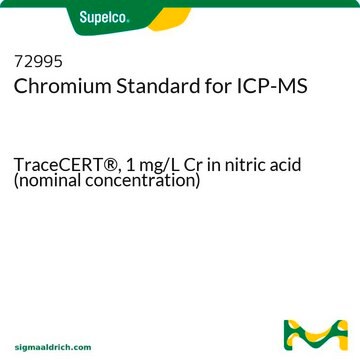ERMBC211
Rice flour (Total As and As species)
ERM®, certified reference material
Sign Into View Organizational & Contract Pricing
All Photos(1)
About This Item
UNSPSC Code:
77101502
NACRES:
NA.24
Recommended Products
grade
certified reference material
Agency
ERM®
manufacturer/tradename
JRC
application(s)
food and beverages
format
matrix material
storage temp.
−20°C
General description
Certified for the mass fractions of total arsenic, the sum of arsenite/arsenate and dimethylarsinic acid
Analysis Note
For more information please see:
ERMBC211
ERMBC211
Other Notes
Certified for the analytes listed below. See certificate for values and more details
Trace Elements / Metallorganics: Dimethylarsinic acid, Total Arsenic (As), The sum of arsenite and arsenate
Matrix Group: Nuts, Soy, Edible Oils and Fats
Trace Elements / Metallorganics: Dimethylarsinic acid, Total Arsenic (As), The sum of arsenite and arsenate
Matrix Group: Nuts, Soy, Edible Oils and Fats
Legal Information
ERM is a registered trademark of European Commission
Storage Class Code
11 - Combustible Solids
WGK
WGK 3
Flash Point(F)
Not applicable
Flash Point(C)
Not applicable
Choose from one of the most recent versions:
Certificates of Analysis (COA)
Lot/Batch Number
Sorry, we don't have COAs for this product available online at this time.
If you need assistance, please contact Customer Support.
Already Own This Product?
Find documentation for the products that you have recently purchased in the Document Library.
Customers Also Viewed
Peter M Kopittke et al.
The New phytologist, 201(4), 1251-1262 (2013-11-12)
• Accumulation of arsenic (As) within plant tissues represents a human health risk, but there remains much to learn regarding the speciation of As within plants. • We developed synchrotron-based fluorescence-X-ray absorption near-edge spectroscopy (fluorescence-XANES) imaging in hydrated and fresh
Rima Juskelis et al.
Journal of agricultural and food chemistry, 61(45), 10670-10676 (2013-10-02)
The aim of this study was to conduct a survey of arsenic (As) content in rice cereals for infants. The analysis was based on the FDA Elemental Analysis Manual (EAM 4.11). An inductively coupled plasma mass spectrometer (ICP-MS) was used
Yudan Wei et al.
International journal of environmental health research, 24(5), 459-470 (2013-11-19)
Exposure to inorganic arsenic in the general population occurs mainly from drinking water and food sources. This study examined the association between rice consumption and urinary concentrations of arsenic in US adults, aged 20-85 years, in the 2003-2006 National Health
Sait C Sofuoglu et al.
Food and chemical toxicology : an international journal published for the British Industrial Biological Research Association, 64, 184-191 (2013-12-04)
Arsenic species were determined in rice and bulgur samples that were collected from 50 participants who also supplied exposure related information through a questionnaire survey. Speciation analysis was conducted using an HPLC-ICP-MS system. Ingestion exposure to arsenic and associated health
Noriko Yamaguchi et al.
Environmental science & technology, 48(3), 1549-1556 (2014-01-05)
Elevated arsenic (As) concentrations in rice and the soil solution result from changes in soil redox conditions, influenced by the water management practices during rice cultivation. Microscale changes in redox conditions from rhizosphere to soil matrix affect the As speciation
Our team of scientists has experience in all areas of research including Life Science, Material Science, Chemical Synthesis, Chromatography, Analytical and many others.
Contact Technical Service





